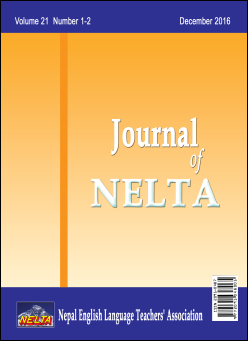Learner Autonomy: A Western Hegemony in English Language Teaching to Enhance Students’ Learning for Non-Western Cultural Context
DOI:
https://doi.org/10.3126/nelta.v21i1-2.20209Keywords:
Learner autonomy, Western hegemony, Innovative method, Cultural contextAbstract
The paper is concerned about the concept of learner autonomy as a western hegemony in English language teaching to enhance students’ learning for non-Western cultural context. The concept of learner autonomy was developed in the Western countries creating independent and autonomous culture for learners to prepare them; learning to learn, however for it got its continuation as an innovative method to the non-Western countries of dependent culture where parents set up the cultural values and norms for children. Such practice of framing the norms for children is regarded against the cultural assumption of learner autonomy which is considered as Western hegemony for non-Western cultural context. Based on the literature and empirical evidences, the paper argues how learner autonomy as a Western hegemony in English language teaching enhances students’ learning in diverse cultural contexts of non-Western countries. With the conceptual, theoretical and practical understanding, the paper explores how learner autonomy as a Western hegemony in English language teaching enhances students’ learning for non-Western cultural context.
Journal of NELTA, Vol. 21, No. 1-2, 2016, Page: 128-139
Downloads
Downloads
Published
How to Cite
Issue
Section
License
© Nepal English Language Teachers’ Association (NELTA)
Authors are required to transfer their copyright to the Nepal English Language Teachers' Association (NELTA)
The Journal of NELTA is copyright by Nepal English Language Teachers’ Association (NELTA). Apart from citing/referencing in academic works, no part of any materials may be reproduced by any process without prior written permission from its copyright owner – NELTA. Requests and enquiries concerning reproduction and rights may be addressed to NELTA or the editorial board at neltaeditorialboard@gmail.com.




